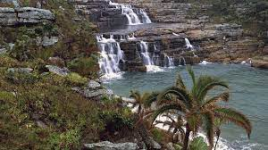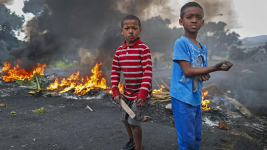- Joined
- Apr 18, 2013
- Messages
- 94,281
- Reaction score
- 82,665
- Location
- Barsoom
- Gender
- Male
- Political Leaning
- Independent
I once spent 1½ years in Ghana which is a West African nation of about 32 million. Ghana has a coastline of ~335 miles on the Gulf of Guinea. The Greenwich Meridian passes through the city of Tema which is an industrial town about 16 miles east of the capital city Accra. The equator goes right under it so Tema is perhaps the closest location available to the "center of the world". It is the largest port in the country. The clock time in Ghana is the same as the clock time in London (UTC + 0). There are no Daylight Saving Time clock changes. Power generation in Ghana is about one-third hydro (Lake Volta is the largest artificial reservoir in the world) and two-thirds thermal. Power is fairly dependable in the Accra metro area, but iffy in other parts of the country (demand is outpacing supply) which hurts industry and development. Normal AC voltage is 230V 2-wire @ 50hz. European electrical items will work just fine, but electrical items from the US and Canada will require a voltage converter. I spent about a year in Accra (4.5 million), and another 6 months in Kumasi (3.5 million) which is Ghana's second largest city and located in a rain forest region near Lake Bosomtwe. Because of its tropical climate, gorgeous beaches, and dense rainforests, Ghana is a highly desired international tourist destination.
English is the official legal national language, but few are proficcient and of those that are the accent is British. Most people use one of the Akan/Ashanti family of indigenous languages (70+) for everyday use. Most people in Accra speak Ga or Dangbe. The predominant language in Kumasi is Twi. Before independence, Ghana was a British colony that was surrounded by former French colonies. If you travel along the coastline, you can still see many former British forts and castles. Some are museums and many are in disrepair. Some of these forts were a part of the slave trade with Europe and the Americas. About 75% of Ghanans are Christian, and about 11% are Muslim. They are actually far more religious than most Westerners. There are no religious problems. Ghana is a functioning democracy, and the people are perhaps the most friendly in all of Africa. Ghana has a tropical climate and two distinct seasons, the wet seaon and the dry season. Accra actually has two wet seasons, March-July and September-October with the heaviest rainfall occurring in June. The dry season occurs between November to February. A typical wet/dry day begins with a temperature of 84°F (feels like 94°F due to the humidity and Dew Point). Around noon the temp is 96°F (feels like 103°F). At night the temps will remain in the mid-low 80's. I never once saw the temp go below 60°F. Being on the equator, the sun is big and intense. The beaches are gorgeous, yet not inundated with too many people. Most people cannot afford a day of such leisure. Currently, 56.1 % of the population of Ghana is urban and the median age is 21. There are ~346 people per square mile. Every 48 seconds, the poplation of Ghana increases by one. The GDP is $60 billion annually. Ghana is ~90,000 square miles in size (a tad smaller than Oregon).
When it rains, it rains buckets for an hour or so. In Accra many streets have concrete side gutters that are about 2' wide and 3' deep to handle the intense downpours. This rainwater will evaporate. There are 16 districts and six independent towns in the Greater Accra Metro Area. These run the gamut from very poor to very wealthy. The very wealthy are mostly the white 'Obroni' (Ga = foreigners) who work as business/industry managers. There are also some very wealthy Ghanans who were educated in London etc. and returned home with degrees. The wealthy live in what are called the "Cantonments" which are secure gated communities. Crime in Ghana is actually very low. Property crimes (e.g., theft, robbery, burglary) are the most common crimes. Violent crimes are rare. Murder or rape can get you the death penalty, but no one has been executed in Ghana (firing squad) since 1993. Except for the Cantonments, every independent town in the Greater Accra Metro Area has a huge and sprawling outdoor business market that is difficult to describe. Maybe I'll try in the next installment here, whenever that may happen.
English is the official legal national language, but few are proficcient and of those that are the accent is British. Most people use one of the Akan/Ashanti family of indigenous languages (70+) for everyday use. Most people in Accra speak Ga or Dangbe. The predominant language in Kumasi is Twi. Before independence, Ghana was a British colony that was surrounded by former French colonies. If you travel along the coastline, you can still see many former British forts and castles. Some are museums and many are in disrepair. Some of these forts were a part of the slave trade with Europe and the Americas. About 75% of Ghanans are Christian, and about 11% are Muslim. They are actually far more religious than most Westerners. There are no religious problems. Ghana is a functioning democracy, and the people are perhaps the most friendly in all of Africa. Ghana has a tropical climate and two distinct seasons, the wet seaon and the dry season. Accra actually has two wet seasons, March-July and September-October with the heaviest rainfall occurring in June. The dry season occurs between November to February. A typical wet/dry day begins with a temperature of 84°F (feels like 94°F due to the humidity and Dew Point). Around noon the temp is 96°F (feels like 103°F). At night the temps will remain in the mid-low 80's. I never once saw the temp go below 60°F. Being on the equator, the sun is big and intense. The beaches are gorgeous, yet not inundated with too many people. Most people cannot afford a day of such leisure. Currently, 56.1 % of the population of Ghana is urban and the median age is 21. There are ~346 people per square mile. Every 48 seconds, the poplation of Ghana increases by one. The GDP is $60 billion annually. Ghana is ~90,000 square miles in size (a tad smaller than Oregon).
When it rains, it rains buckets for an hour or so. In Accra many streets have concrete side gutters that are about 2' wide and 3' deep to handle the intense downpours. This rainwater will evaporate. There are 16 districts and six independent towns in the Greater Accra Metro Area. These run the gamut from very poor to very wealthy. The very wealthy are mostly the white 'Obroni' (Ga = foreigners) who work as business/industry managers. There are also some very wealthy Ghanans who were educated in London etc. and returned home with degrees. The wealthy live in what are called the "Cantonments" which are secure gated communities. Crime in Ghana is actually very low. Property crimes (e.g., theft, robbery, burglary) are the most common crimes. Violent crimes are rare. Murder or rape can get you the death penalty, but no one has been executed in Ghana (firing squad) since 1993. Except for the Cantonments, every independent town in the Greater Accra Metro Area has a huge and sprawling outdoor business market that is difficult to describe. Maybe I'll try in the next installment here, whenever that may happen.


